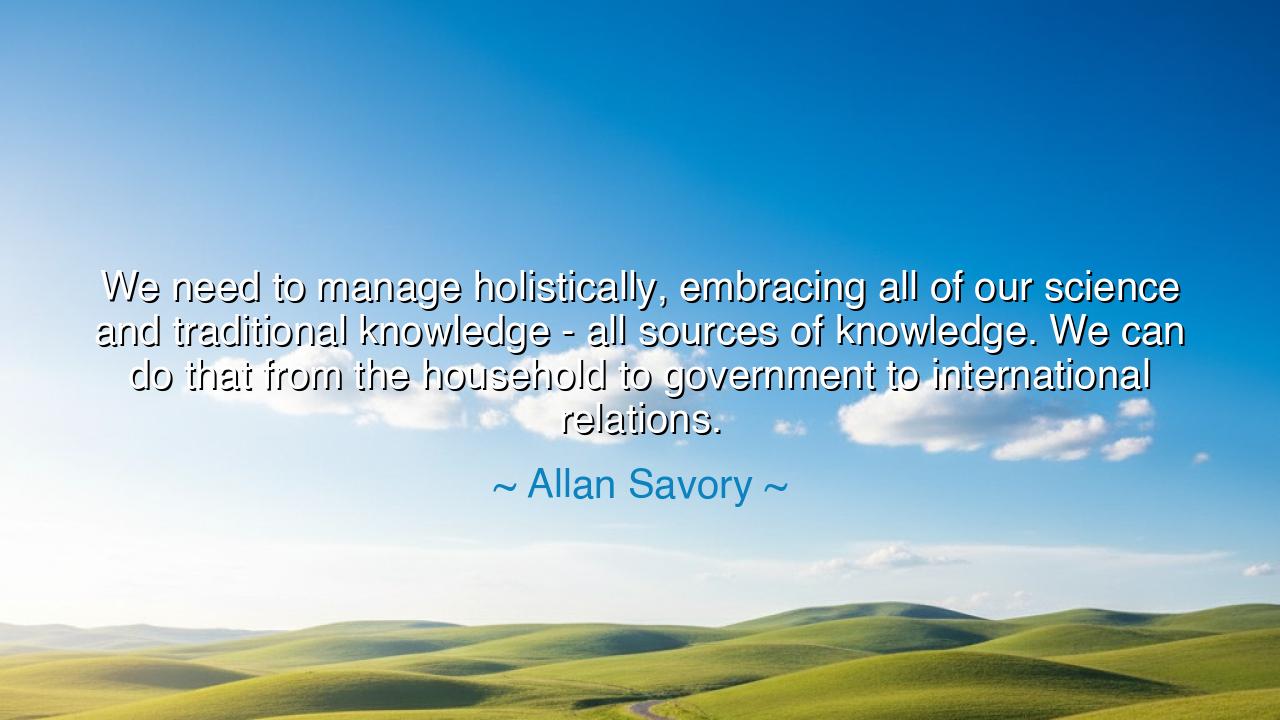
We need to manage holistically, embracing all of our science and
We need to manage holistically, embracing all of our science and traditional knowledge - all sources of knowledge. We can do that from the household to government to international relations.






The words of Allan Savory — “We need to manage holistically, embracing all of our science and traditional knowledge — all sources of knowledge. We can do that from the household to government to international relations” — are a call to return to wholeness. They remind us that wisdom is not born in isolation. It is not found solely in laboratories or ancient temples, but in the union of both — in the harmony between modern science and the ancestral wisdom that once guided humanity through the rhythms of the earth. His message is a plea for holistic management, a vision that transcends boundaries and hierarchies, from the smallest home to the grandest nations.
In the style of the ancients, we might say: the world has become fragmented, for men have forgotten that knowledge, like a river, flows from many springs. Science, with its sharp precision, has given us tools to measure, predict, and alter. But traditional knowledge — the knowing of seasons, soil, and spirit — teaches us to feel, to belong, to live in balance. When we discard one in favor of the other, we sever our connection to the great circle of life. Savory, through his work in holistic land management, saw how ignoring this balance led to the ruin of once-fertile lands, turning them into deserts of despair.
Consider the African savannahs, where Allan Savory first tested his ideas. The conventional wisdom of scientists at the time said that overgrazing by livestock caused land degradation. The solution, they said, was to remove animals and let the land rest. Yet when Savory followed this advice, he watched with grief as the land died even faster — rivers dried, grass vanished, and wildlife disappeared. Only when he embraced both scientific observation and indigenous grazing practices, allowing herds to mimic the ancient movements of wild animals, did life return. Grasslands revived, streams flowed once more, and biodiversity bloomed where ruin had once reigned.
This story is a parable for all human endeavors. The farmer who listens to the soil and the stars, the leader who listens to both data and the people's hearts, the diplomat who honors both modern policy and timeless values — these are the true stewards of life. Holistic management does not belong to agriculture alone; it belongs to governance, to education, to the family itself. It asks of us: can we think as the earth thinks, seeing how every thread is bound to another in the web of being?
The ancients knew this truth well. The Chinese sages spoke of the Dao, the balance between heaven and earth. The Greeks spoke of sophia — wisdom that joins reason with virtue. The Native peoples of the Americas spoke of walking in beauty, where every action must honor the seventh generation yet unborn. Each of these teachings is a reflection of what Savory calls us to remember: that knowledge must be integrated, not divided, that understanding comes when heart and mind serve the same purpose.
In our time, we see the consequences of forgetting this unity. Our technologies advance, but our spirits languish. Governments design policies for growth while neglecting the soil that feeds them. Families chase progress but lose the tenderness that sustains love. Nations speak of peace but act from fear. The cure, as Savory proclaims, is holistic vision — seeing the whole, not merely the part. From the household to the halls of power, we must govern with empathy as well as efficiency, and with remembrance as well as innovation.
Let each of us, then, become a keeper of the balance. In our homes, let us blend science with care — understanding nutrition but honoring the meal as sacred. In our communities, let us plan with data but listen with compassion. In our nations, let us marry economic wisdom with ecological truth. For the fate of the earth depends not on knowledge alone, but on the integration of all knowledge — ancient and modern, intuitive and rational, local and global.
And the lesson that endures is this: wholeness is strength. A society that honors all sources of wisdom builds not just prosperity, but endurance. The path forward is not one of domination, but of union. If we are to heal the planet and ourselves, we must do as Savory teaches — manage holistically, live inclusively, and think universally. Only then will the household, the nation, and the world become one great circle once again.






AAdministratorAdministrator
Welcome, honored guests. Please leave a comment, we will respond soon